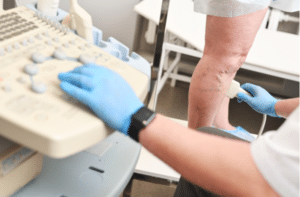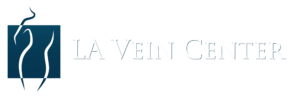
How Does Venous Ultrasound Work?
You may know that an ultrasound is somewhat like an x-ray (except without the radiation). It is a form of imaging that shows a doctor the inside of the body. Ultrasound imaging involves the use of high-frequency sound waves. When these sound waves are directed internally in some area of the body, they meet with certain structures. In our interest, the high-frequency sound waves come in contact with the veins. We don’t just see the veins, but we see how large they are. We see reflux if it’s happening and can spot the valve that is not functioning properly. A venous ultrasound can observe the movement of blood through the veins and where veins branch off or intersect. The information obtained via this diagnostic imaging is integral to reaching an accurate diagnosis and treatment plan.
What Happens During a Venous Ultrasound?
A venous ultrasound takes less than an hour. Patients scheduled for this exam should hydrate well starting days before the test. It is also very beneficial to wear loose-fitting clothing. To perform the ultrasound exam, the technician first applies a water-soluble gel to the skin. This smoothes the movement of the applicator across the area being studied. The gel is also a kind of conduit that directs the high-frequency sound waves internally, toward the veins. To examine the area, the technician presses the applicator against the skin and moves it slowly, pausing now and then if they spot a detail of interest. Ultrasounds can spot blood clots and other blockages as well as distention in affected veins. The exam will include observation when the patient is in a lying position and also while they are standing. This change in posture provides the best view of all veins and also helps the technician note differences in circulation between the two positions.
To treat the symptoms of venous insufficiency successfully, the doctor needs to have the most accurate information at their disposal. Venous ultrasound provides just that. If you are ready to explore your vein treatment options, contact LA Vein Center at (818) 325-0400.

